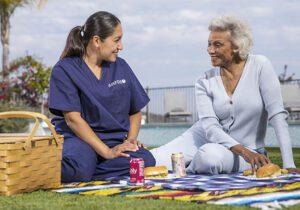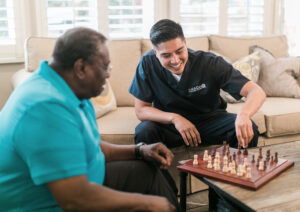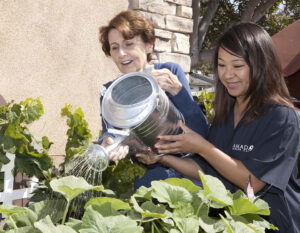As we age, it’s normal for some mental processes to slow down. You or your elderly loved one may have noticed changes like slower decision-making, difficulty recalling words, or a reduced ability to focus. This is part of what’s known as cognitive decline, a natural part of aging that doesn’t always mean disease—but it can impact quality of life.
The good news? Cognitive decline is not entirely inevitable. In fact, research continues to show that seniors can take meaningful steps to maintain and even improve brain health. The key lies in promoting cognitive vitality—a state of mental strength, curiosity, adaptability, and resilience.
Here are some evidence-based lifestyle strategies to help preserve cognitive vitality in older adults:
Lifelong Learning: Fuel for the Aging Brain
If you’ve ever heard someone say “you can’t teach an old dog new tricks,” forget it—it’s simply not true. Studies show that older adults and seniors can learn just as effectively as younger ones when given the right support. Not only does learning new skills keep the brain active, but it also promotes a strong sense of purpose and joy.
At age 76, James decided to learn Spanish using a free app so he could converse with his bilingual grandchildren. Not only did it sharpen his memory, but it also deepened family connections.
Ways to encourage lifelong learning:
- Take a free online course on sites like Coursera, Udemy, or Senior Planet. AARP offers a deep bank of online classes in its My Learning Library.
- Join a local history, book, or film discussion group
- Try something creative like painting, writing, or music
- Explore your family tree or start a journal
Learning keeps the brain flexible and forms new neural connections. It can help seniors feel confident, engaged, and empowered.
Strengthening Decision-Making Skills in Seniors
As brain structure changes with age, decision-making can become more difficult. Seniors may hesitate over everyday choices or feel overwhelmed by big ones. Rather than taking over decisions for them, offer supportive questions that guide reasoning and promote confidence.
Instead of telling Laura what to buy at the store, her caregiver asks:
- “What meals do you want to cook this week?”
- “What do we already have at home?”
- “Here’s your budget—what do you want to prioritize?”
These questions don’t take power away; they build it back.
Social Engagement: More Than Just Conversation for Aging Adults
Isolation is one of the most dangerous threats to cognitive and emotional well-being in older adults. Lack of interaction can lead to depression, increased cognitive decline, and even shorter lifespans.
Engaging in conversations, storytelling, games, or group activities exercises memory, empathy, and critical thinking—all vital brain functions.
Helen, 84, joined a weekly history discussion group at her local senior center. She found it not only educational but energizing. “It keeps my brain moving,” she said, “and I’ve made new friends.”
Ways to stay socially active:
- Join a senior center’s group classes or clubs
- Attend community lectures, volunteer, or mentor others
- Start a family Zoom night or shared online game
Fitness and Nutrition: Fueling the Mind Through the Body
There’s a strong link between physical activity and brain health. Aerobic exercise—like walking, dancing, or swimming—improves blood flow to the brain and helps form new brain cells.
A balanced diet with B vitamins, omega-3 fatty acids, and antioxidants protects the brain from cognitive decline. Focus on leafy greens, berries, nuts, whole grains, and fish.
Seniors living alone may struggle to shop or cook. Consider meal delivery services, community programs, or caregiver assistance.
Stress Reduction: Training the Mind for Resilience
Unmanaged stress harms the brain—especially the hippocampus, the area responsible for memory. Seniors with chronic stress are more at risk for anxiety, confusion, and memory problems.
Bob and Grace always argued about what to watch on TV. Instead of competing, they made a joint decision to find a show they both enjoy. This small act of compromise reduced daily friction and increased their emotional harmony.
Stress-reducing strategies for seniors:
- Practice breathing exercises or guided meditation
- Walk outdoors or do gentle stretching
- Engage in creative outlets like knitting, music, or writing
- Reframe negative thoughts with realistic, positive ones
Create a Culture of Curiosity at Home Among Seniors and Family Members
Caregivers and families play a key role in keeping seniors mentally engaged. Encourage your loved one to:
- Learn something new with you (a new recipe, hobby, or tech skill)
- Celebrate progress, no matter how small
- Talk about current events, books, or life stories
The most powerful message you can give a senior is: “You’re never too old to grow, learn, and discover.”
Maintaining Cognitive Vitality is Part of Healthy Aging
Cognitive vitality isn’t about preserving youth—it’s about maintaining strength, flexibility, and joy in the aging process. From lifelong learning and social connection to healthy eating and stress reduction, every step counts. The earlier and more consistently we encourage these habits, the better chance seniors have to enjoy a vibrant, mentally active life well into their golden years.
If you’d like to learn more about in-home care that helps promote cognitive vitality either for yourself or an aging loved one, we invite you to reach out to us at Amada Senior Care by CLICKING HERE to find an Amada office near you. A trained Amada caregiver can provide the support needed for healthy aging and living safely and independently.















